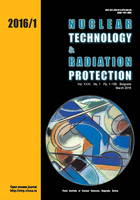
CHARACTERIZATION OF CONTROL ROD WORTHS AND FUEL ROD POWER PEAKING FACTORS IN THE UNIVERSITY OF UTAH TRIGA MARK I REACTOR
Pages: 16-27
Authors: Fawaz Alroumi, Donghoon Kim, Ryan Schow, and Tatjana Jevremovic
Abstract
Control rod reactivity (worths) for the three control rods and fuel rod power peaking factors in the University of Utah research reactor (100 kW TRIGA Mark I) are characterized using the AGENT code system and the results described in this paper. These values are compared to the MCNP6 and existing experimental measurements. In addition, the eigenvalue, neutron spatial flux distributions and reaction rates are analyzed and discussed. The AGENT code system is widely benchmarked for various reactor types and complexities in their geometric arrangements of the assemblies and reactor core material distributions. Thus, it is used as a base methodology to evaluate neutronics variables of the research reactor at the University of Utah. With its much shorter computation time than MCNP6, AGENT provides agreement with the MCNP6 within a 0.5 % difference for the eigenvalue and a maximum difference of 10% in the power peaking factor values. Differential and integral control rod worths obtained by AGENT show well agreement with MCNP6 and the theoretical model. However, regulating the control rod worth is somewhat overestimated by both MCNP6 and AGENT models when compared to the experimental/theoretical values. In comparison to MCNP6, the total control rod worths and shutdown margin obtained with AGENT show better agreement to the experimental values.
Key words: AGENT, TRIGA, MCNP6, control rod worth, reactivity, criticality, power peaking factor
FULL PAPER IN PDF FORMAT (1.55 MB)
